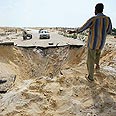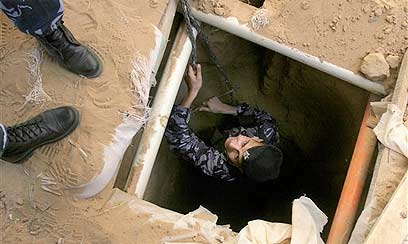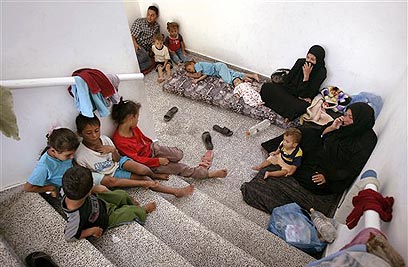
Palestinians in Rafah fear they are next
In southern Gaza Strip, Palestinians preparing for possibility IDF will launch offensive in Rafah now that operation in Beit Hanoun is winding down
The operation in Beit Hanoun ended on Tuesday morning but in the Gaza Strip Palestinians know that lull is only temporary as their attention focuses south on Rafah along the border with Egypt.
Residents of the southern town fear that the Israel Defense Forces' next military operation will be in their midst.
Israeli troops carried out several pinpoint operations in Rafah over the last four months since the June 25 kidnapping of Corporal Gilad Shalit.
But residents fear that large-scale operation could be launched to curb arms smuggling from the Sinai desert through tunnels.
"In the same fashion that the operation in Beit Hanoun could not halt Qassam fire, here too, no operation can halt the tunnels," locals say.

Palestinian security officers inspecting tunnel (Photo; AP)
At the Rafah border crossing, the Gaza Strip's only window to the outside world, Palestinian security officials say the crossing has been closed for four days.
Since Shalit's kidnapping in a cross-border attack near southern Gaza, the crossing was rarely opened.
Abu Nabil, a shop owner in the area, said he opened his shop on Tuesday to avoid being bored: "I sold nothing for a number of days. Whom shall I sell to if there are no passengers coming and going through the crossing. The Jews want to starve us and the tunnels are just an excuse. Everything is made-up stories because they want to come back here."
But not everyone agree with Abu Nabil. Residents say most of the weapons smuggled into Gaza are purchased by Hamas who "pay the best and fastest."
Theory: Smugglers linked to IDF
One of the theories going around in Rafah is that major smugglers are operated by Israel.
"So long smuggling involves drugs, cigarettes and other products, the Israeli army turns a blind eye. But when arms are involved, the IDF knows the content of the shipment before it enters the tunnel," says another Rafah resident.
He says that one smuggler sold rockets to Hamas for thousands of dinars but got paid many times over his profit by the IDF for informing about the sale. The IDF then notified the Palestinian Authority police who were ordered to seize the weapons and deliver them to the Erez crossing, which is operated by Israel.
Denying any connection to smuggling activities, the same resident said: "Once you have a tunnel work fast, as fast as possible. Tunnel lifespan is very short, it can be a day. If you are lucky it can last years. But when there is a new tunnel the whole of Rafah knows."

Rafah residents seek shelter during IDF operation (Photo: AP)
In the Zabbadiyeh neighborhood, a handful of unemployed men smoke cigarettes and recall their arrest by IDF troops a few weeks ago. "There are tunnels and there is he who looks after them. Even if he looks innocent," says my Gazan guide.
"Anything that brings money: Cigarettes, tobacco, gold, people, weapons, drugs, and manly opium. Everything and anything you want, and anything that is in demand. There is a tunnel every meter. There are hundreds of tunnels, maybe thousands. How can they stop all that?," one of the unemployed men said.
My guide makes a correction: "Believe me – he is not unemployed. He's a guard or a messenger."
In his sixties, Abu Mousaad was in an IDF detention center for four days with his three sons. "The Jews treated us well and after interrogating us they released nearly most of us. But the Imam and preacher of the mosque were among few to stay in the detention center and the mosque was abandoned for four days," he said.
Abu Mousaad explains why he is opposed to the tunnels: "He who agrees to have a tunnel dug in his house to earn money for the family risks attracting the Jews who come and destroy six houses and leave a hundred people with no roof over their heads."
The unemployed men laugh at Abu Mousaad's appraisal of the good treatment Palestinian detainees received at the detention center by IDF soldiers: "We were like dogs there. Maybe they treated the elderly a little differently, but it was shit."
The last military incursion in Rafah was precise. Soldiers inspected nine houses, located nine tunnels, destroyed them and left. "That shows they know everything," says Shatian Shatiwi, 30.
His father remains in IDF custody. "They took him to Kerem Shalom and told him 'you work as a guard in one of the tunnels', they meant a security guard. Dad denied; he never heard of tunnels. His court hearing is next Sunday and I hope he will be released. We don't know what the Jews want from us. Which guard? My father is a simple man; poor him."










